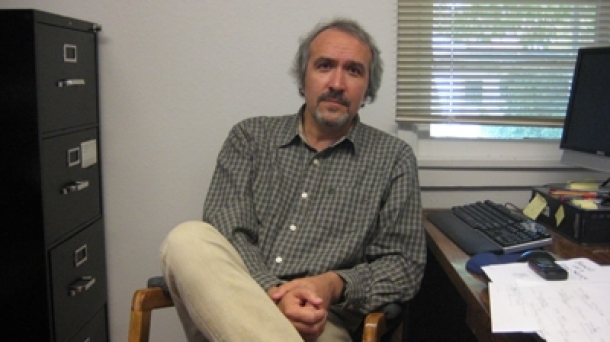news
Basques around the world
Basque experience in Boise still very intense- BSU Prof A. Santana
Igor Lansorena
Boise
Alberto Santana, a true authority in the subject of Basque culture in its different fields, recognizes that what he found once he got to Boise was much more powerful than what he expected.
Basque identity is conceived in the Diaspora differently than in the Basque Country, says Alberto Santana, director of the Basque Studies Program at Boise State University, in an exclusive interview for eitb.com in Boise.
According to Alberto, there is no problem with different identities clashing against each other in Boise or in any other places in the Diaspora. "In the Basque Country, identities are exclusive. Here, they feel proud that identities can be combined, you can choose more than one".
However, this has not been the only surprise for Alberto Santana when he first came to this American city, which is mainly known in the Basque Country for being home to one of the biggest and most active Basque-American communities. "I have found much more than what I first expected", he recognizes.
"I have found people with a deep awareness of being Basque, which has been renewed through the different generations and waves of immigrants. And at the same time, they are adding historical identity to the state of Idaho and Boise itself. Nowadays, the Basques are an important part of Boise’s heart. They have become the hub of the identity of the state and of the city without loosing their own identity", Alberto adds.
Alberto Santana, professor at the Spanish Open University UNED, official in charge of artistic and cultural heritage of the County Council of Bizkaia, and script writer of the program "La Mirada Mágica" for the Basque media group EITB, accepted, on the spot, a two-year job as director of the Basque Studies Program at Boise State University, and moved to Boise. "Taking into account the airline rules, we just tried to get our lives into a 110 lb. case", he recounts.
Alberto, a true authority in the subject of Basque culture in its different fields, recognizes he had heard of the Basque experience in Boise, but what he found once he got there was much more powerful than what he expected.
"I had heard of the adventure of the Basques in the Far West because of the gap left in the Basque Country, their returns and their presence". However, Alberto says, "It is still a very intense reality".
"I have found almost 15,000 people who declare themselves Basque, of Basque origin or with a Basque ethnic identity". "And at the same time, it is also very intense, not only in number, because it is very present in the daily life, in their meetings, in their celebrations and festivities they have to reaffirm their identity".
Boise State University
For Alberto, the creation of the Center of Basque Studies at BSU shows that the Basque community of Boise is perfectly integrated into all the social, political and cultural groups in the city and the state of Idaho. "The Basques of Idaho, the Basques of Boise, are going to offer their life experience to other communities to be studied and are also going to use it for themselves, to be more aware of who they are and where they come from. In a world of homogenized identities, they are going to offer a vision of difference, of singularity".
His main objective, the new director of the center of Basque studies says, is to offer the Basques of Boise and surrounding areas, tools to know themselves better so that they have bigger knowledge of how they are, and open themselves to the other communities to offer a different perspective in a globalized world.
Some of Alberto's other tasks will be to set links between the center of Basque studies and other programs at BSU. "The center of Basque Studies mainly focuses on aspects related to identity and culture, but it would be desirable to cover more aspects. For example, we have a cuisine school, why not link this to the Basque cuisine?", Alberto wonders.
Last, but not less important, Alberto says, is to collaborate with other universities and to share resources, energies and projects. "The main challenge this years is to create a Basque Studies Consortium between the universities of Boise State, Nevada, California and California State".
The four universities signed an agreement in October 2008 to work together to propel Basque studies to a more enduring stage of development. "We are few and are isolated in a huge ocean and if we do not work together, it is difficult to progress", Alberto recounts.
top stories



-
news
New anti-eviction law
Andalucia begins proceedings to seize confiscated houses from banks
-
news
London attack
British police ponder conspiracy after soldier murder
-
Sport
Giro d'Italia
Nibali tightens grip on overall lead after stage victory
© EITB - 2024 - Privacy Policy - Legal disclaimer - Cookie Policy - Cookie settings


